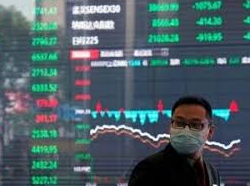Analysts advise caution as sweeping tariff measures by the US continue to shake investor confidence and cloud global economic outlook
Analysts are urging investors to remain cautious as the fallout from sweeping tariffs imposed by US President Donald Trump continues to disrupt financial markets worldwide. Uncertainty remains high, and volatility is expected to endure as investors wait to assess the broader economic repercussions.
On 2 April, Trump announced an unexpected and aggressive tariff package – including a blanket 10 per cent charge on all US imports and much steeper levies for select countries, such as China and the European Union, accused of engaging in unfair trade. The announcement, labelled “Liberation Day” by the White House, triggered immediate panic across global exchanges.
American equities experienced a staggering US$6 trillion drop last week – the worst since the 2020 pandemic crash. Asian and European indices followed suit, with sharp declines recorded at the start of this week.
According to James Ooi of Tiger Brokers, the recent turbulence is unlikely to subside in the near term due to lingering uncertainty about how other nations will respond. China has already retaliated with tariffs of 34 per cent on US goods, while countries like Vietnam and India have indicated a willingness to negotiate with Washington.
Nomura analysts echoed the sentiment, noting that equity markets remain exposed, despite recent sell-offs. The full extent of the economic impact is still unquantified and will likely take time to manifest in earnings and data. Additional tariffs on US imports of semiconductors and pharmaceuticals are reportedly under consideration, which could further unsettle markets.
Asian economies, heavily reliant on exports, have been among the hardest hit. Nomura recommended a defensive stance, suggesting investors steer clear of riskier regional stocks unless there is a clear reversal in US trade policy.
Despite significant corrections, many market watchers discourage bargain hunting at this stage. Nomura believes there may be further downside before valuations stabilise. When the broader impact of the slowdown becomes fully priced in, the landscape might become more attractive for longer-term investors – but that moment has not yet arrived.
Some see opportunity in specific markets. Zane Aw of Phillip Securities highlighted the potential resilience of Chinese and Hong Kong stocks, suggesting policy flexibility could allow these economies to mitigate the impact of US tariffs. Monetary tools and fiscal easing may help prop up domestic consumption.
Kai Wang of Morningstar advised focusing on less cyclical sectors such as consumer staples and utilities, which have historically weathered tariff-related shocks well. He cautioned against indiscriminate investment, stressing the importance of selectivity.
Investors were also urged to consider companies with strong financial fundamentals – those with low leverage and steady cash flows – while increasing exposure to safer assets such as gold and bonds. Demand for gold ETFs has surged, with Tiger Brokers reporting buy volumes exceeding sales by over 120 per cent year-to-date.
As interest in diversification grows, bonds are once again drawing attention. According to Hugh Chung of Endowus, high-quality fixed income instruments are increasingly valuable given the heightened risk of a US-led recession.
Singapore has not escaped unscathed. The Straits Times Index fell 7.5 per cent on Monday to 3,540.5, having briefly dipped by as much as 8.5 per cent. Analysts at DBS revised their year-end target downwards in response to ongoing instability.
Banking stocks took a major hit – DBS lost over 9 per cent, OCBC fell nearly 7 per cent, and UOB dropped 6.3 per cent. However, long-term investors remain steady, with analysts suggesting the recent slump could represent a buying opportunity for dividend-seeking holders.
Outside financials, defensive picks such as Singtel, Sheng Siong and ComfortDelGro are drawing attention, while real estate investment trusts (REITs) continue to appeal due to their stability and income potential.
Industrial REITs, in particular, are tipped to outperform, bolstered by growing demand from logistics and e-commerce, long-term lease structures and less exposure to interest rate fluctuations. Historical resilience during Trump’s earlier tariff push in 2018–19 offers some hope of a repeat performance.
For now, though, investors are being told to tread carefully. The landscape remains fraught with unpredictability, and any substantial shift in market sentiment will likely depend on clearer signals from Washington and its trade partners.








